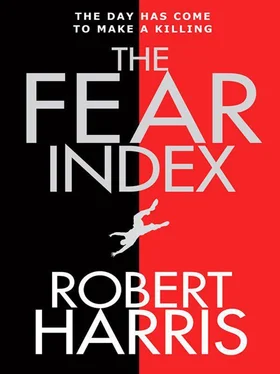Robert Harris - The Fear Index
Здесь есть возможность читать онлайн «Robert Harris - The Fear Index» весь текст электронной книги совершенно бесплатно (целиком полную версию без сокращений). В некоторых случаях можно слушать аудио, скачать через торрент в формате fb2 и присутствует краткое содержание. Жанр: Триллер, на английском языке. Описание произведения, (предисловие) а так же отзывы посетителей доступны на портале библиотеки ЛибКат.
- Название:The Fear Index
- Автор:
- Жанр:
- Год:неизвестен
- ISBN:нет данных
- Рейтинг книги:4 / 5. Голосов: 1
-
Избранное:Добавить в избранное
- Отзывы:
-
Ваша оценка:
- 80
- 1
- 2
- 3
- 4
- 5
The Fear Index: краткое содержание, описание и аннотация
Предлагаем к чтению аннотацию, описание, краткое содержание или предисловие (зависит от того, что написал сам автор книги «The Fear Index»). Если вы не нашли необходимую информацию о книге — напишите в комментариях, мы постараемся отыскать её.
The Fear Index — читать онлайн бесплатно полную книгу (весь текст) целиком
Ниже представлен текст книги, разбитый по страницам. Система сохранения места последней прочитанной страницы, позволяет с удобством читать онлайн бесплатно книгу «The Fear Index», без необходимости каждый раз заново искать на чём Вы остановились. Поставьте закладку, и сможете в любой момент перейти на страницу, на которой закончили чтение.
Интервал:
Закладка:
Quarry said, ‘Any news of Alex?’
‘It appears he forced a driver out of his car and stole it. We’re looking for him now.’
Quarry said, ‘This is unbelievable-’
Leclerc cut him off. ‘Excuse me, monsieur: could I see Dr Hoffmann’s office, please?’
Quarry at once looked shifty. ‘I’m not altogether sure about that. I think perhaps I ought to call in our lawyer…’
Leclerc said firmly, ‘I’m sure he would advise full co-operation.’ He wondered what the financier was trying to hide.
Quarry backed down immediately. ‘Yes, of course.’
Inside Hoffmann’s office there was still debris on the floor. The hole in the ceiling gaped above the desk. Leclerc looked up at it in bewilderment. ‘When did this happen?’
Quarry grimaced with embarrassment, as if having to confess to the existence of a mad relative. ‘About an hour ago. Alex pulled down the smoke detector.’
‘Why?’
‘He believed there was a camera inside.’
‘And was there?’
‘Yes.’
‘Who installed it?’
‘Our security consultant, Maurice Genoud.’
‘On whose authority?’
‘Well…’ Quarry could see no escape. ‘Actually, it turns out to have been Alex.’
‘Hoffmann was spying on himself?’
‘Yes, apparently. But he couldn’t remember ordering it.’
‘And where is Genoud now?’
‘I believe he went down to talk to your men when Gana’s body was discovered. He also handles security for this whole building.’
Leclerc sat at Hoffmann’s desk and started opening the drawers.
Quarry said, ‘Don’t you need a warrant to do that?’
‘No.’ Leclerc found the Darwin book, and the CD from the radiology department of the University Hospital. On the sofa he noticed a laptop lying discarded. He went across and opened it, studied the photograph of Hoffmann, then went into the file of his exchanges with the dead man, Karp. He was so absorbed, he barely glanced up when Ju-Long came in.
Ju-Long said, ‘Excuse me, Hugo – I think you ought to take a look at what’s happening on the markets.’
Quarry, frowning, bent over the screen, switching from display to display. The slide was beginning in earnest now. The VIX was going through the roof, the euro sinking, investors pulling out of equities and scrambling for shelter in gold and ten-year Treasury bonds, the yields of which were falling fast. Everywhere money was being sucked out of the market – in electronically traded S amp;P futures alone, in the space of little more than ninety minutes, buy-side liquidity had dropped from $6 billion to $2.5 billion.
Here it comes, he thought.
He said, ‘Inspector, if we’re done here, I need to get back to work. There’s a big sell-off underway in New York.’
‘What’s the point?’ asked Ju-Long. ‘We’re not in control anyway.’
The edge of despair in his voice caused Leclerc to look up sharply.
‘We’re having a few technical problems,’ explained Quarry. He could see the suspicion on Leclerc’s face. It would be a nightmare if the police inquiry moved on from Hoffmann’s mental breakdown to the breakdown of the entire company. The regulators would be all over them by morning. ‘It’s nothing to worry about, but I ought just to talk to our computer people…’
He started to move from the desk, but Leclerc said firmly: ‘Wait, please.’ He was looking out over the trading floor. Until that moment he hadn’t really registered that the company itself might be in difficulties. But now he noticed, in addition to the anxious groups of employees, several others scurrying around. There was a definite message of panic in their body language, which at first he had ascribed to the death of their colleague and the disappearance of their leader, but now he realised it was separate to that, wider. ‘What sort of technical problems?’ he asked.
There was a brief knock on the door and a gendarme stuck his head into the room.
‘We’ve got a trace on the stolen car.’
Leclerc swung round to face him.
‘Where is it?’
‘A guy at a petrol station in Zimeysa just called. Someone matching Hoffmann’s description driving a black BMW just bought a hundred litres of fuel.’
‘A hundred litres? My God, how far is he planning to go?’
‘That’s why the guy called. He says he didn’t put it in the tank.’
Fifty-four Route de Clerval turned out to be at the end of a long road that took in a cargo-handling facility and a waste-recycling plant before dwindling into a cul-de-sac beside the railway tracks. The building stood out pale in the dusk through a screen of trees: a boxy steel structure, two or three storeys high – it was difficult for him to estimate the height in the absence of any windows – with security lights mounted along the edge of the roof and video cameras protruding from the corners. They turned to follow Hoffmann as he passed. A small slip road led up to a set of metal gates; beyond was an empty car park. The whole site was secured by a steel perimeter fence surmounted with triple strands of razor wire. He guessed it might have been built originally as a warehouse or distribution centre. It was surely not custom-designed: there had not been enough time. Hoffmann drew up in front of the gates. At window-level next to him were a keypad console and an entryphone; beside them the tiny pinkish elephant’s-eye of an infrared camera.
He leaned over and pressed the buzzer and waited. Nothing happened. He looked across at the building; it seemed derelict. He considered what was logical from the machine’s point of view, then tried keying in the smallest number expressible as the sum of two cubes in two different ways. At once the gates began to slide open.
He drove slowly across the car park and along the side of the building. In the wing mirror he could see the camera following him. The stink of the petrol on the back seat was making him feel ill. He turned the corner and pulled up in front of a big steel shutter, a truck-sized delivery entrance. A video camera mounted above it was trained directly on him. He got out of the car and approached the door. Like the offices of the hedge fund, it was controlled by face recognition. He stood in front of the scanner. The response was immediate, the shutter rising like a theatre curtain to reveal an empty loading bay. Hoffmann turned to walk back to the car and saw, as he did so, in the distance on the other side of the railway tracks, a travelling light show of flashing red and blue moving very fast; a scrap of siren from the police car carried in the wind.
He drove quickly into the bay, lurched to a halt, turned off the engine and listened. He couldn’t hear the siren now. It was probably nothing to do with him. He decided he would close the shutter behind him in any case, but when he examined the control panel he couldn’t find a light switch. He had to use his teeth to tear open the plastic packaging around the torch. He checked it was working, then pressed the button to close the shutter. There was a warning buzzer; an orange lamp flashed. Darkness descended with the steel slats. Within ten seconds the bottom of the shutter clattered against the concrete floor, extinguishing the thin line of daylight. He felt alone in the darkness, the victim of his own imaginings. The silence was not quite absolute: he could make out something. He took the crowbar from the front seat of the BMW. With his left hand he shone the torch around the bare walls and on to the ceiling, picking out yet another surveillance camera, perched high in the corner looking down at him malevolently, or so he thought. Beneath it was a metal door, again activated by face recognition. He tucked the crowbar under his arm, shone the torch on to his face and tentatively pressed his hand against the pad. For several seconds nothing happened, and then – almost, it seemed to him, reluctantly – the door opened on to a short flight of wooden steps that led up to a passage.
Читать дальшеИнтервал:
Закладка:
Похожие книги на «The Fear Index»
Представляем Вашему вниманию похожие книги на «The Fear Index» списком для выбора. Мы отобрали схожую по названию и смыслу литературу в надежде предоставить читателям больше вариантов отыскать новые, интересные, ещё непрочитанные произведения.
Обсуждение, отзывы о книге «The Fear Index» и просто собственные мнения читателей. Оставьте ваши комментарии, напишите, что Вы думаете о произведении, его смысле или главных героях. Укажите что конкретно понравилось, а что нет, и почему Вы так считаете.










